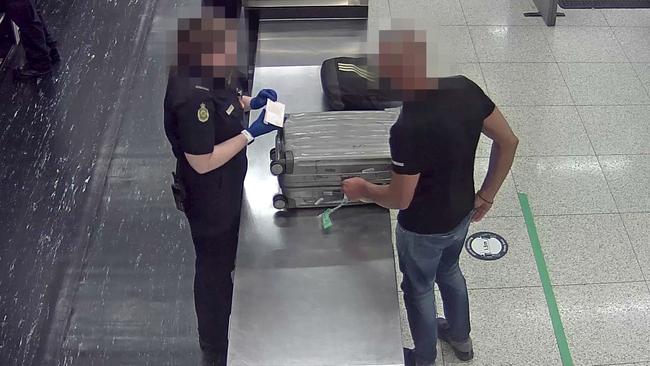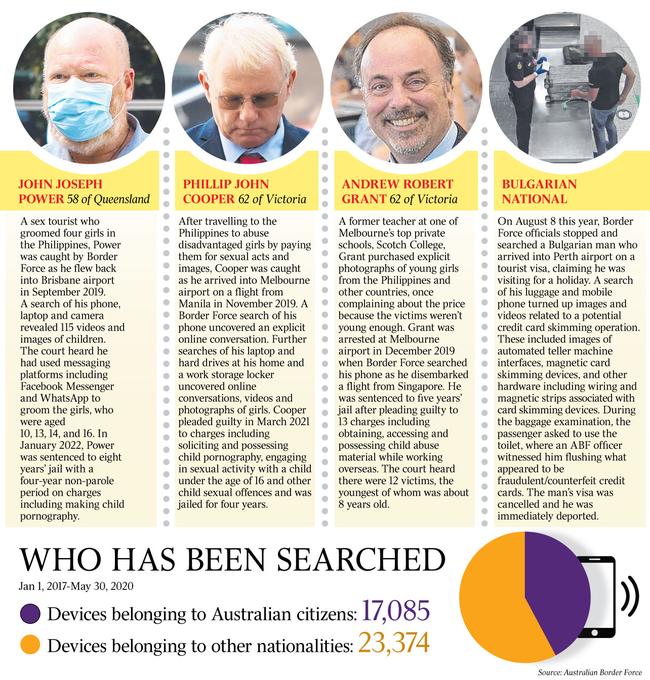Data trips up crims in warrant-free searches
More than 600 phones, devices have been intercepted at airports this year with evidence of crimes such as child abuse, fraud.

More than 600 phones and other electronic devices have been intercepted at Australian airports this year containing evidence of crimes such as child abuse, production of child pornography and credit card fraud.
Australian Border Force officers who found the incriminating data were able to search travellers’ devices as they passed through Customs without needing a warrant – an extraordinary power not available a few metres away in airport arrival and departure halls.
The warrantless searches, which in recent years have led to dozens of pedophiles, sex tourists and fraudsters being jailed, have sparked a debate about whether the correct balance has been struck between identifying criminals and protecting innocent people’s digital privacy.
Border Force has searched 2149 phones and other devices this year, with 628 of those searches identifying potentially criminal material such as child abuse videos and photos, or evidence of people travelling overseas to abuse children. Incoming passengers planning credit cards and identity frauds were also identified, including a Bulgarian national found with card-skimming devices when he arrived in Australia last month.
More than 10.5 million travellers have crossed Australia’s international borders so far this year.
Border Force said it did not target people at random and its searches were targeted, with the high success rate of 29.2 per cent of the searches showing the targeting was accurate.
Privacy advocates questioned the practice of warrantless searches, and the Greens accused Border Force of “mercilessly exploiting’’ loopholes in the Customs Act, which was originally designed to allow officers to search baggage, not digital devices.
The commander of the ABF’s tactical capability branch, Lauren Richardson, said passengers’ devices were only searched if they had a risk profile identified by the ABF.
“We don’t pick up your mum and dads, your grandparents crossing the border,’’ Ms Richardson said. “Calendar year to date, it’s less than 1 per cent of travellers over the border have had their devices examined.’’
Ms Richardson said almost 30 per cent of those searches had resulted in material being located that led Border Force to seize the device or copy the data for further examination. “So it’s a fairly high strike rate but a very low rate of travellers … who do end up with their devices examined,’’ she said.
The power to conduct the searches without a warrant is found within the Customs Act 1901, which allows officers to search incoming and outgoing baggage for anything crossing the border that may pose a threat.
The relevant section of the Act, section 186A, was updated in 1999 to take into account the digital era and gives the ABF power to search and copy digital data, but critics say it’s a workaround and Border Force should reach a higher level of suspicion before it intercepts a traveller and takes away devices for examination. The act does not give the ABF power to require people to hand over their passcodes to open the devices, nor to search data stored in the cloud.

Greens home affairs spokesman Nick McKim said Border Force should be required to meet the same standard in the Customs halls of airports as other law enforcement agencies did elsewhere in Australia, and obtain a warrant before they searched the devices.
“We also think the ABF needs to go to far greater steps to remind people of their rights: what can and can’t be searched,’’ Senator McKim said. “While we are not suggesting any illegality, what we are saying is that the law needs to be changed so that there needs to be reasonable belief people have committed a crime and a warrant sought on that basis before ABF starts trawling through people’s private telephones.”
He said the Customs Act needed updating “to take into account the digital age’’.
“Border Force have found a loophole and they’re mercilessly exploiting it,” he said.
Home Affairs Minister Clare O’Neil declined to comment.
Former Home Affairs Minister Karen Andrews backed Border Force’s use of the warrantless searches.
“I do support the use of those powers. Protecting our children has to be one of the priorities of a federal government as well as states and territories,’’ she told Sky News.
“We know there is an increase in child pornography, it’s not common these days for pornography to be brought in to Austrlaia in hard copy. So a lot more information, a lot more prongraphy, is being brought in electronically.
“So it’s important that the Australian Border Force uses the powers that it has to detect ...this will lead to prosecutions of people who are potentially going to put Australian children at harm and may well have already done so in other parts of the world.’’
More than 40,000 devices were searched without a warrant in the five years before the Covid-19 pandemic shut down international travel. A total of 17,085 devices belonging to Australian citizens and 23,374 devices owned by people of other nationalities were searched between January 1, 2017 and May 30, 2020. Ms Richardson said she empathised with those who underwent searches, but Customs searches were “tried and tested and it is quite expected when you are travelling around the world, whether it’s through baggage, person or electronic devices”.
She said digital device searches had been happening for years, prior to the merger of Australian Border Force and Customs, and that the ABF had established a digital forensics units 20 years ago.
Ms Richardson said the “risk profile” of travellers who were searched could include a prior criminal record, intelligence from other law-enforcement agencies, or unusual travel patterns.
She said ABF’s computer scanned conversation threads and in some cases had found messages discussing false passports, plans to travel for the purposes of sexually abusing children, and other identity and credit card frauds.
“It can search the whole phone so wherever you have stored documents, whether that’s in a file or instant messaging platform, it will be searched,’’ she said.
The search can also identity if a person has accessed the dark web. Internet search histories can also be identified if ABF holds the device for further examination.
Travellers may have data that triggers ABF computers, such as an intimate photos of their partner taken with consent, or of their children or grandchildren.
“I can empathise with people travelling through the border concerned about that too,’’ Ms Richardson said. “Obviously we have a statutory requirement to be able to ask those questions to the individual … and if they are able to explain why they might have those images, and that satisfies the officer that is making those decisions.”
It is not an offence to refuse to provide Border Force with the passcode to open digital devices.
People found with illegal data such as child-abuse material are referred to the Australian Federal Police, or state and territory police for investigation. Illicit data found in the past was predominantly child abuse material, but also included templates for printing 3D firearms, a person planning a sham marriage, people carrying terrorism propaganda, and fake identification documents.
Privacy group Digital Rights Watch said it was “very uncomfortable’’ with the practice and Border Force should be required to prove reasonable suspicion and obtain a warrant before they were conducted. “Phones and laptops aren’t the same as dirty clothes and souvenirs, they are intimate devices that often contain our entire lives,’’ said Digital Rights Watch executive director James Clark.



